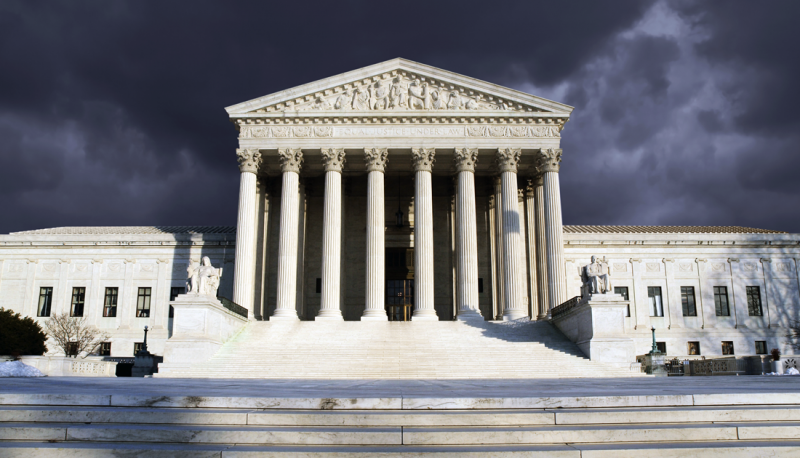“Confirmed Judges, Confirmed Fears” is a blog series documenting the harmful impact of President Trump’s judges on Americans’ rights and liberties. Cases in the series can be found by issue and by judge at this link.
Trump Eighth Circuit judges David Stras and Ralph Erickson reversed a district court and ruled that two women could not bring a claim against a police officer whose deliberate lies resulted in their arrest and imprisonment for more than two years, although neither was convicted of any crime. The December 2020 decision was in Mohamud v Weyker.
Hawo Ahmed and Hamdi Muhamud were attacked one evening at a Minneapolis apartment building by a third woman, Muna Abdulkadir, who was brandishing a knife and smashed Ahmed’s windshield. Muhamud and Ahmed called 911, while Abdulkadir called St. Paul police officer Heather Weyker. Abdulkadir was cooperating in a “plagued” investigation by Weyker of sex trafficking that produced zero convictions and “numerous civil rights complaints” against Weyker. “Worried about the possibility of losing a witness,” the court of appeals stated, “Weyker sprang into action.”
Initially, Weyker called the police officer who took the 911 call and falsely stated that she had “information and documentation” that Muhamud and Ahmed were trying to “intimidate” Abdulkadir for cooperating in her federal investigation. (Weyker had been temporarily deputized as a federal officer.) As a result of Weyker’s “intentional misrepresentation,” police took no action against Abdulkadir, but arrested Muhamud and Ahmed on suspicion of “tampering with a federal witness.”
As explained in the complaint later filed by the two women, Weyker then prepared a criminal complaint and affidavit in which she “fabricated facts” and “knowingly relayed false information” in order to keep them detained for crimes for which she “knew” there was “no actual probable cause.” Mohamud was then a minor, but she and Ahmed spent more than two years each in custody, during which time Ahmed gave birth to a child. Both were then released, with the government dismissing all charges against Mohamud and a jury acquitting Ahmed.
The two women then filed suit against Weyker for her misconduct and the harm it had caused to them. Because Weyker’s status was then unclear, they sued her both as a state official under 42 USC sec 1983 and as a deputized federal official under the Supreme Court’s Bivens doctrine that allows lawsuits against federal officers for violating the Constitution. The district court rejected Weyker’s claims that she should get qualified immunity as a state official and that Bivens did not authorize a claim against her as a federal official, and the Eighth Circuit considered her appeal.
In a 2-1 decision written by Trump judge Stras and joined by Trump judge Erickson, the Eighth Circuit reversed the ruling that Muhamud and Ahmed could seek liability against Weyker under Bivens. Stras maintained that liability under Bivens would be improper because it would require an “extension” of the principles of the case to “different” circumstances. Although he conceded that Bivens also involved a false arrest without probable cause, he argued that there were “meaningful” differences, such as the fact that Bivens involved an officer’s entry into a home where he himself made the false arrest. Stras and Erickson accordingly ruled that the Bivens claim was invalid and sent the case back to the district court to consider the qualified immunity issue if Weyker was acting under color of state law.
Judge Jane Kelly strongly dissented. At least with respect to the claim that Weyker caused the two women to be falsely arrested without probable cause, Kelly explained, the case does not represent “an extension of Bivens” but instead “falls squarely within the cause of action recognized by Bivens itself.” Despite Stras’ claim that Bivens has become “disfavored,” Kelly continued, the Supreme Court has recently declined to “cast doubt on the continued force” of Bivens, which the courts have applied to cases involving “false arrest” and “fabrication of evidence.” The alleged differences relied on by Stras, she went on, do “not undermine the fact” that in both cases, the key injuries “stemmed from the [false] arrest itself.”
Judge Kelly also pointed out that in a related case, the district court has recently determined that at the time in question, Welker was acting as “a federally deputized officer, not under color of state law.” The result, she concluded, is that a sec a983 claim is “unavailable,” and the decision by Stras and Erickson will “have the likely effect of denying plaintiffs any legal remedy for the constitutional violation they allege.” The case is yet another example of Trump judges helping law enforcement officials to escape accountability for serious misconduct.

